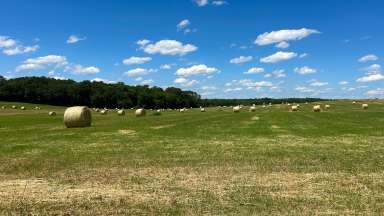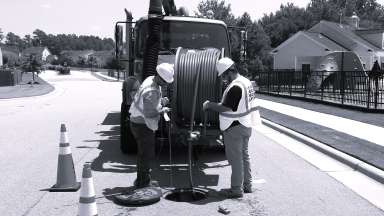Did you know that Raleigh Water has a farm? Not one with cows, goats, or chickens, but Raleigh Water owns nearly 2,000 acres of land, of which 700 acres are actively farmed. Think… rows and rows of crops, and seeing some local wildlife like deer, coyotes, and hawks. The crops change and differ depending on the seasons and growing rotations, but currently, a cycle of corn, sorghum, fescue hay, and coastal Bermuda is being grown on the land.
Raleigh Water provides water, so why do we need farmland?
No, it’s not just because it looks pretty. To understand why, we need to think about wastewater treatment and recovering the resources from the wastewater we collect. Untreated wastewater contains nitrogen. If not removed before being released back into the river, it could cause harmful algal blooms and kill fish in the Neuse River. Our Resource Recovery Facility processes remove nitrogen without impacting the Neuse River.
Let's rewind a bit.
Have you ever heard of the Chinchas or the Guanar War in the 1860s? Believe it or not, people fought over bird poop -- seriously you read that right. Why? Because bird droppings are rich in nitrogen. At that time nitrogen was a resource in high demand because fertilizer was not artificially made yet. Back to current day... after the wastewater goes through the entire treatment process at Neuse River Resource Recovery Facility, we end up with a bunch of fertilizer. This is where having farmland helps dispose of the naturally made fertilizer (a product that you all helped create.)
A step further, the farm reclaims some of that treated water before it goes back into the Neuse River or delivered to our many facilities that use recycled water. Our farm uses reclaimed water to irrigate our farmland to maximize our production, maximizing the amount of fertilizer we can utilize on our fields.
You won’t see the crops at your local farmers markets around town or grocery store anytime soon, the products are sold to local farmers to feed to livestock.
Why should this matter to me?
Your water bill. Honestly, it can be as simple as that. Land-applying the byproducts of our water means NOT paying to put them in a landfill. Therefore, your water bills will be lower.
Although farm living might not be for everyone, it is for Raleigh Water. Investing in this land years ago continues to help Raleigh Water provide some of the most affordable rates to our customers. Raleigh Water is proud of our staff who manage the disposal of this naturally made fertilizer and maintain our fields.
…it also doesn’t hurt that it makes Raleigh look pretty.

